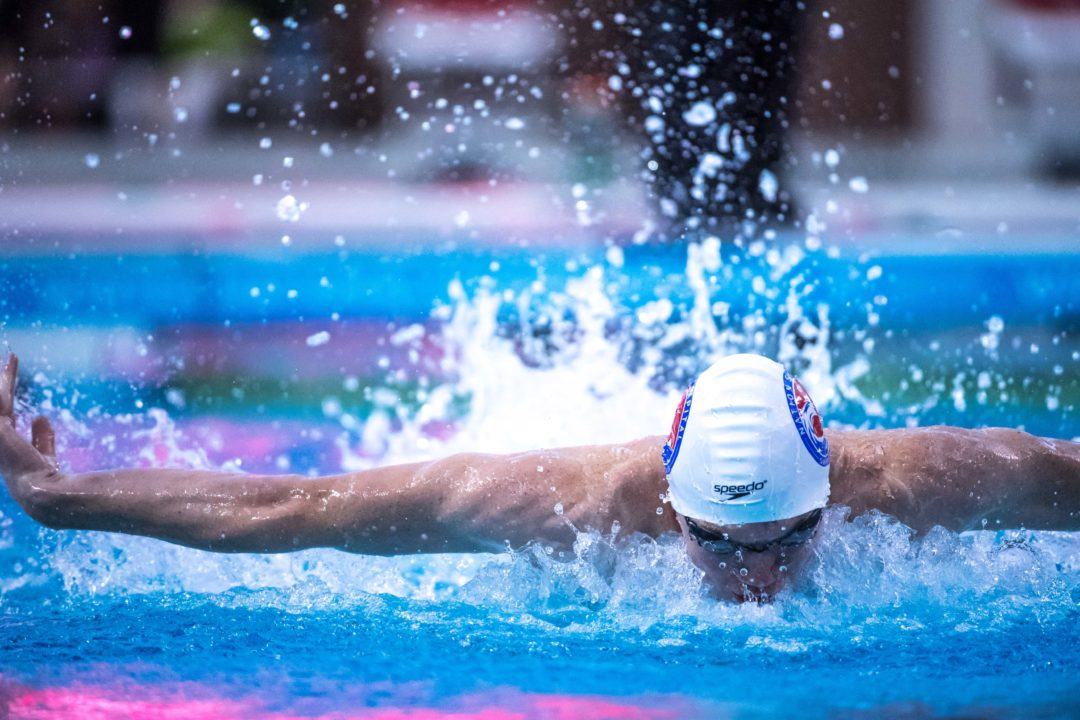Courtesy of Hannah Cooper
Sport psychology is an exciting field that is growing all the time, and in a grueling sport such as swimming enhancing the mental aspect of a swimmer’s arsenal is crucial to success. One of the most common questions I get from coaches, parents and swimmers regarding sport psychology is how to start tweaking the swimming mind. A great place to start for most teams is with a workshop on basic mental skills delivered by a qualified professional. This is cost effective as it can be done in a large group and is suitable for any swimmer from age-groupers to NCAA athletes. This type of workshop content that is highlighted in this article is designed to be an introduction, a taster, to some mental skills that swimmers can add to their tool belt to help them in practice and competitive settings. While it is best that mental skills are taught by a skilled professional, this article aims to entice swimmers, coaches, and parents such that they see the value in reaching out to a sport psychology expert near them!
The first mental skill, the basis on which much of sport psychology is set is goal setting. Every swimmer should know what their short term and long terms goals are! Goals need to be S.M.A.R.T.
Specific: I want to go a personal best by 1 second in the 100 breast
Measureable: How will you know when you achieve this goal?
Attainable (yet challenging!): Take into account what is reasonable, but your goals should excite you!
Relevant: Relates to your training and is personal to you
Time-Specific: I want to get a sectional qualifying time by the end of February
Each swimmer also needs process and outcome goals. Outcome goals are the end result, such as going a best time at the end of the season. There is less day-to-day control over outcome goals. Process goals are what gets that swimmer to the end result, such as having good attendance, working on streamlining past the flags, etc. To be most successful a swimmer needs to set both types of goals! Goals should be constantly updated and kept visible. This is to help with a swimmers’ day-to-day motivation and build self-belief and confidence.
The next technique is imagery. Imagery is not simply visualisation. It involves all of the senses when most successful. This technique is used to prepare the brain for any scenario on race day, before race day. Therefore, practice visualising all scenarios: the good, the bad, and the ugly! For example, if a swimmer already knows how they will handle their goggles breaking behind the blocks that will reduce stress and anxiety if it should happen. Visualising can be done sitting still or standing and acting out what is being visualised behind closed eyes.
Let’s Practice:
1. Walking to your front door after training
a. 1st person or 3rd person (either is fine!)
b. What could you see? Hear? Smell?
2. A swimmer’s best event
a. What lane were you in? Did you hear the beep? Could you smell the chlorine?
Another mental skill to add to the tool belt is self-talk. We all talk to ourselves, so why not harness that natural tendency and use it to improve swimming performance! Self-talk can be either instructional or motivational. Instructional self-talk aids technical execution (eg. “use my legs” or “elbows high”) and can be used to increase focus and concentration (eg. “focus now” or “long strokes”). On the other hand, motivational self-talk helps to regulate arousal and anxiety (eg. “I am calm” ) and to build confidence (eg. “I am stronger than ever”). Of note, self-talk can be shortened to cue words, to be used during a race. So for example, if you want to remember to do 3 dolphin kicks off your last wall, you can say to yourself, “three” or “wall.” Self-talk works best when the swimmer creates it using what words are natural to them.
Bonus: Have a swimmer struggling to relax before a meet? Try this basic relation technique!
” Find a comfortable place to sit or lie down where you will not be interrupted.
” You will tense each muscle group in turn for about 5 seconds, and then release the tension and feel the muscle relax. Starting from your toes and finishing with your face.
” Throughout this exercise it may help to visualise the muscles tensing and a wave of relaxation flowing over them as you release that tension.
” Allow your attention to focus only on your body. If you begin to notice your mind wandering, bring it back to the muscle you are working on.
” Remember to keep breathing throughout this technique.
For coaches and parents:
Help your swimmers self-reflect. What has worked for them? What hasn’t? How will they change and adjust their state of mind for the future? All mental skills must be practiced, adapted, and used consistently. Just like a change in physical swimming technique it can take time for a mental skill to become useful and natural, and each must be adapted for each individual.
Finally, take their word as truth. If your swimmer says that they are anxious or burned out or struggling in anyway take that as fact. Do not compare what you perceive their experience to be to other swimmers or yourself. Yes, maybe they don’t seem as anxious or struggling as another swimmer, but to them this feeling is very much real, and they are coming to you for guidance and support.
About Hannah Cooper
Hannah has a Masters degree in Applied Sport Psychology and currently works as a performance psychologist in London and across the UK for a variety of athletes/clients and teams including Swim England.
